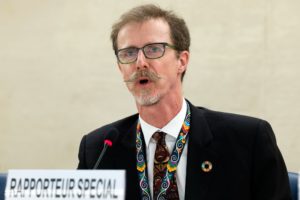By Catherine Ageno
Climate activists in Uganda have expressed optimism about a draft resolution recognizing the human right to a clean, healthy and sustainable environment that is expected to be voted on by the UN General Assembly this week.
The resolution calls upon States and international organizations to adopt policies and scale up efforts to ensure a clean, healthy, and sustainable environment for all.
The draft text was presented to the 193-member Assembly- the UN’s most representative body, last June by Costa Rica, the Maldives, Morocco, Slovenia, and Switzerland presented the draft text to the 193-member Assembly, following the landmark resolution adoption of a similar text adopted in October 2021 by the UN Human Rights Council.
Climate activist and Deputy Executive Director Environment Shield Robert Mr Turyakira has welcomed the resolution saying it is timely and will go a long way in pushing governments to take the much-needed action to address the disastrous effects of climate change.
Mr Turyakira is optimistic that the UN resolution will provide the much-needed impetus to propel action against climate change impacts like hunger that has so far claimed hundreds of lives in the Karamoja and Lango sub-regions, and affected thousands more in the East and Horn of Africa.
He is concerned though, that while such resolutions are well-intentioned, they may become simply cosmetic if governments do not enforce their recommendations that are meant to save humanity.
“But the biggest challenge is that the governments which are supposed to be concerned seem to be thinking there is a lot of time, yet there isn’t. If you read the report of the inter-governmental l panel on climate change, it clearly states that if things continue this way we shall find ourselves at a point of no return. This is why there has been this decade of action from 2020- 2030 to ensure that we take action and respond as urgently as possible”, he told KFM.
Turyakira is however hopeful that if given a “yes” vote, the environment-related laws already in place in Uganda, plus the recently signed Climate Change Act, will provide a springboard for the implementation of the recommendations to UN member governments.
“Indeed in Uganda, we have been trying to make some progress. For example when you look at the passing of the Climate Change Act which the president signed recently. It has very good provisions, calling for a very robust approach to climate impact assessment and ensuring that we avert some of these environmental disasters”, Mr Turyakira added.
His comments come as a high-level regional inter-ministerial opens on Wednesday morning in Uganda’s capital Kampala, at the Speke Resort Munyonyo with focus on migration, environment, and climate change in the East and Horn of Africa.
The three-day event has attracted participants from 12 regional member states and other African member states and seeks to enhance cooperation about climate change-induced human mobility, including migration, displacement, and planned relocation.
Several other stakeholders across the globe have spoken out on the looming global hunger resulting from climate disasters.
The UN News on Monday quoted the UN General Assembly President Abdullah Shahid as saying that scaling up climate resilience across food systems was among the actions needed to counter rising hunger and malnutrition, during a meeting to address the global food crisis.
Other local climate activists have told KFM that a “yes” vote on the resolution is important because it will help highlight the fact that the entire global population is in this together.
In an earlier interview with UN News, the UN Special Rapporteur on Human Rights and the Environment, Mr. David Boyd, explained why it is important for the wider UN membership to recognize the right.

“This right was not included in the Universal Declaration of Human Rights back in 1948. So, this is a historic resolution that will change the very nature of international human rights law, he told UN News early this week.
Mr Boyd emphasized the need for countries to vote ‘yes’ on this resolution saying it is important because in the face of the triple environmental crisis countries are facing – rapid climate change, the loss of biodiversity, and pervasive toxic pollution that’s killing 9 million people every year – there’s an urgent need for transformative changes to society, we need to quickly shift to renewable energy.
Although the General Assembly resolutions are not binding, and so countries do not have a legal obligation to comply with them, Mr Boyd explained that countries don’t have a legal obligation, but they have a moral obligation.
Other UN Experts and Special Rapporteurs, the UN Environment Programme (UNEP) chief Inger Andersen, as well as the High Commissioner of Human Rights, Michele Bachelet, have expressed their support for the recognition of the right to a healthy environment in the past months.








